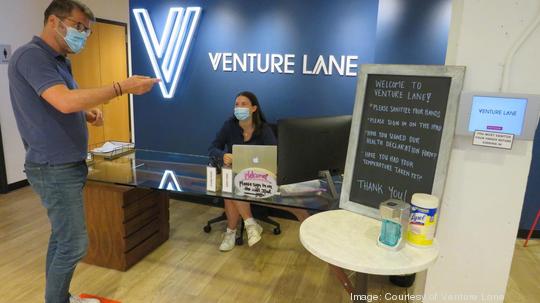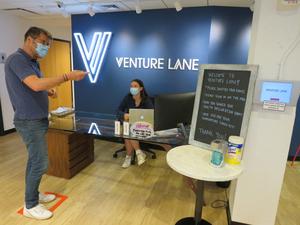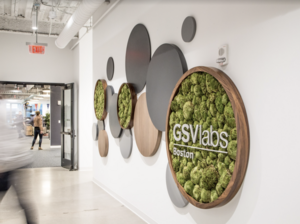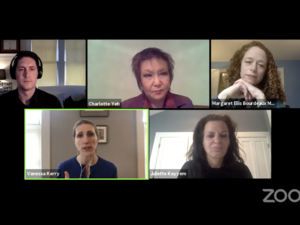
When GSVlabs shut down its downtown coworking location at the beginning of the month, it raised a very real question for Techstars Boston managing director Clement Cazalot and his team: Did the startup accelerator really need a physical space, given how many teams are still operating remotely amid the pandemic?
Techstars Boston had been operating out of GSVlabs, the coworking space that closed on Nov. 1. TechStars had expected it would eventually move to Venture Lane, another downtown coworking space that launched in early 2019. For Cazalot, Venture Lane's value proposition went beyond the physical space: It markets itself as a "startup hub," one that connects a community of entrepreneurs digitally as well as IRL — something that's especially crucial these days. When Covid-19 threw a wrench into things, that digital connection put Venture Lane over the top.
"Does Techstars, during or after Covid, need a physical presence or not? The answer was yes, not just for the space but more for the community," Cazalot said. "It's an entrepreneurial community that is totally addictive to the Techstars ecosystem."
Techstars Boston, which welcomed its latest cohort this month, is now operating out of Venture Lane on a kind of hybrid model. The accelerator is remote-first, but teams can come in as needed — as long as they comply with Venture Lane's safety policies. When the space reopened in June, all members were asked to sign a health-declaration form, confirm that they had not been in contact with anyone with Covid-19 or experienced symptoms within the last 14 days and use a symptom checker app to track how they feel.
"With Techstars, I'm trying to be part of ecosystems where the companies are staying long after the program," Cazalot said.
EdTech space race
Techstars Boston is the second major accelerator that recently migrated to Venture Lane. This summer, the LearnLaunch Institute — the edtech-focused nonprofit connected to the LearnLaunch Accelerator — shuttered its coworking space, LearnLaunch Campus. LearnLaunch co-founder and angel investor Jean Hammond had a similar decision to make: whether her accelerator program, which had run remotely with relative success, needed a physical space. The answer, unequivocally, was yes. It did.
"We certainly know that there are things that were much harder because it was remote," Hammond said. "We also think [the teams] learn a lot less from each other. When you’re actually there with each other, it’s almost impossible for you not to learn from each other. We’re bringing in some people to teach and some people to learn."
For both Hammond and Cazalot, a big part of Venture Lane's draw is the fact that it retains early-stage companies, ones that have recently graduated from accelerator programs but aren't grown enough to need their own offices. LearnLaunch alumni startups CareAcademy and Quality Interactions are housed at Venture Lane, Hammond points out; so are alumni of Y Combinator, Techstars, MIT Delta V, MassChallenge and Harvard Launch Lab X.
Venture Lane also has an active member Slack channel. Its newest initiative is building out its own digital platform for member companies to connect with one another remotely.
Founder Christian Magel envisions a future in which startups have about 20 percent of their teams working out of a physical space at any given time. But unlike in the past, when physical presence has directly led to better opportunities for entrepreneurs, he wants to make sure remote workers are included at the same level.
"With the pandemic, the need for an ecosystem and a community did not go away," Magel said. "Actually, people are more eager than ever to collaborate with each other and have people to reach out to. The first step is getting Venture Lane back into our space, but secondly, building out a digital platform helping connect hybrid teams, remote teams and physically present teams."
Hammond is not currently running a LearnLaunch cohort, but when she does, she imagines it will be a hybrid of remote and in-person programming. The teams can take workshops online one week, then come in and whiteboard the next week.
The model will also give teams flexibility for certain workers to come in if they need office space for any reason.
"We feel like it’s a good in person when you want to be, not in person when you don’t," Hammond said. "There’s only so many Zoom calls a human being can go through."







